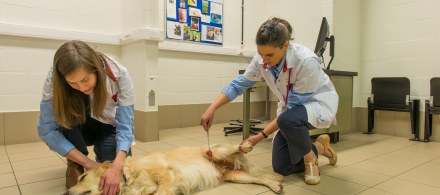Epilepsy in dogs and cats
Epilepsy is one of the most common chronic neurological conditions seen in veterinary practice. “Epicentrum” is one part of the Neurology and Neurochemistry section in the Department of Small Animals, Faculty of Veterinary Medicine (Ghent University). Our team aims to give better support to patients (dogs and cats) with epilepsy.
Epilepsy occurs in dogs, just as in people, and it can be genetic epilepsy or epilepsy for which no direct cause can be found. This type of epilepsy, just as in humans, needs to be treated with medication. However, for one third of dogs this has unsatisfactory – or even no – results. In other words, they still suffer very frequent epileptic seizures, leading to a poor quality of life for both the dogs and their owners. The Epicentrum team conducts research into alternative treatment options for getting dogs’ epileptic attacks better under control. Neurostimulation, such as transcranial magnetic stimulation, is also used on humans. This is a simple, non-invasive, and pain-free way to stimulate the brain in order to reduce the frequency, severity, and duration of seizures. We hope that this will have good results so that fewer dogs with medicine-resistant epilepsy have to be put to sleep.
There are plans in the near future for scientific studies on transcranial magnetic stimulation in pet dogs with epilepsy.
Vision
If neurostimulation can reduce the frequency of epileptic seizures in dogs, this offers hope of better prospects in the future and will undoubtedly improve the quality of life for dogs and their owners.
Want to make a donation to the Epicentrum?
It is impossible to conduct high quality academic research without funding. Without your help, we will not be able to move forwards. We gratefully welcome your donation to the Epicentrum – donations can be made via bank transfer to the account number BE26 3900 9658 0329, including the message “Epicentrum". Your gift is tax deductible starting from €40 per year.
